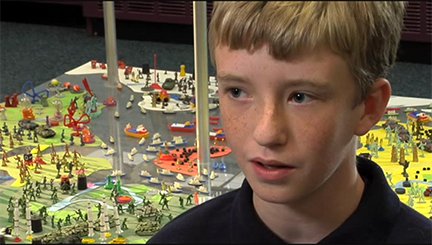Program
 Two core programs of earthDECKS are complementary. The first, Game*Changers, identifies thought and action leaders changing the game. The second, earthDECKS Alerts, is evolving into a platform to enable model “resilient smart cities” to share best practices.
Two core programs of earthDECKS are complementary. The first, Game*Changers, identifies thought and action leaders changing the game. The second, earthDECKS Alerts, is evolving into a platform to enable model “resilient smart cities” to share best practices.
The trailer for a future film series called Game*Changers draws from history, starting with two stories
- The game Monopoly flipped to contradict its original inventor’s vision.
- Its successor, World Game, is being revived in new forms to harness the potential of crowdsourcing, mobile, and collaborative tools to evolve into a Big Play to save Spaceship Earth.
earthDECKS presents Game*Changers to celebrate all those who lead by example. Media for learning tells their stories, shows their model projects and describes the leading edge initiatives spawned by their big ideas. We highlight Innovation Stars with great products and initiatives to promote a more sustainable planet, as in John Hunter’s World Peace Game (photo below).
The history of Monopoly as a folk game in the 1920s and 1930s highlights the importance of “localizing” specific elements of each regional game by those who play it so that the game reflects the unique needs and creative capacity for innovation of each community.
earthDECKS offers an open-ended, generic gaming framework, a regional 21st century version of World Game. Collaborative intelligence in globally distributed, loosely linked regional, mini-gaming sessions taps the knowledge of individuals in each region, individuals addressing their local problems, learning by networking with other teams of individuals for global impact. This approach to eco-sustainability is not a massively multi-player World Game, but a network of bottom up, mini-games, as individuals exchange and share knowledge, making iterative adjustments, addressing global environmental challenges at the local level.
The broad concept of the game is embedded in empty constructs, templates akin to the lean canvas, which players specify to suit their local needs as they share ideas and build collaboration, adapting to respond to local needs. As in biological evolution, “genetic diversity” is valued and supported, enabling various versions to be shared and compared, and adapted as players learn from each other. If the game degenerates into one standard corporate product, its original mission, and vision, will be lost.
After spending many years developing the theoretical ecosystem model that describes collaborative intelligence, Zann Gill founded earthDECKS to develop its practical applications to real world problems.

Image Credit: John Hunter World Game Curriculum
